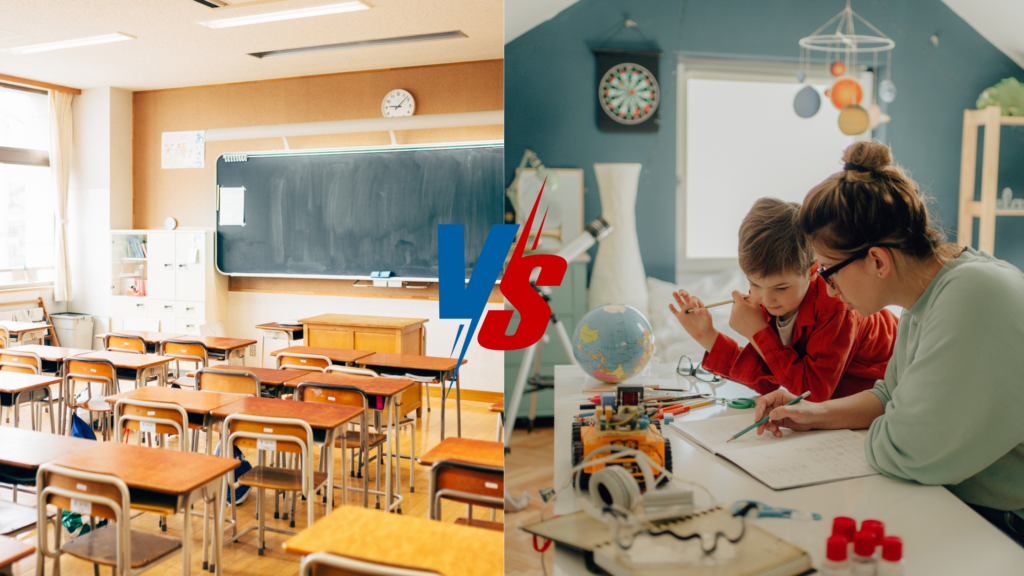Homeschooling vs. traditional school has been a topic of debate for the last few years. Though the curriculum in homeschooling is the same as that of traditional schools, many parents believe that traditional schools are the best way to educate their children.
Furthermore, as COVID-19 dawned in 2020 and students adapted to remote learning, many parents continued homeschooling their children rather than returning to traditional schooling. Similarly, proponents of traditional schools contend that peer pressure, fear of examinations, and discipline teach children to adapt to different situations and also prepare them for the real world.
Whatever it is, whether homeschooling or traditional school, both have their pros and cons. Here, we have discussed the in-depth. Have a look!
What is Homeschooling?
Homeschooling is a new vision that encourages parents to educate their children at home rather than enrolling them in a conventional public or private institution. Parents choose to homeschool their children for varied reasons, such as dissatisfaction with institutions, religious beliefs, family values, different philosophies, and bullying of children.
It is a flexible teaching method in which parents can pick the curriculum, pedagogical approaches, and resources. This enables parents to impart their values and beliefs into their child’s education and customise the educational experience to their child’s particular learning style.
What is Traditional Schooling?
Traditional education refers to learning that actually occurs in a physical classroom with an instructor and students present at all times. The children study in a classroom with their peers, and a teacher is constantly on hand to provide any necessary supervision. There is a daily timetable to be followed by the children. All the children in the classroom have to study all the subjects as defined by the instructor. Examinations are held from time to time to grade the children.
How Does Homeschooling Differ From Traditional Schools?
As the parents decide to choose the right way of schooling, they need to examine the fundamental differences between homeschooling and traditional school. Both have their benefits and drawbacks. Let us examine these differences thoroughly to let you know everything needed to choose!
1. Curriculum
One of the most beneficial aspects of homeschooling is that the curriculum can be tailored to the needs of the child. Lessons can be adjusted to the child’s pace and interests. They can also further explore topics of interest to them by researching them.
As part of the traditional program, children are typically expected to reach the same milestones on the exact dates. Teachers in traditional schools usually present the same subjects to all of the students at once rather than letting them learn at their own pace.
2. Schedule
When children are homeschooled, the study schedule and location can be flexible. Parents can create a schedule that fits their unique requirements, such as travel or medical needs. This flexibility might lead to a less demanding learning environment.
Traditional schools have fixed schedules and timetables. Each child has to follow the same schedule, with no bifurcation of interests. The instructors set this daily routine, and everything happens at fixed times.
3. Social Interaction
Children who are homeschooled may miss out on crucial opportunities for peer interaction. They will miss the potential to make new friends, form bonds, and play during meals. Additionally, they need more diversity in terms of culture and socioeconomic standing.
In traditional schooling, there is a great chance of extensive interaction with peers. Sharing lessons, caring for each other, and having tiffin together are great options for connecting with peers.
4. Instructor-to-child ratio
Homeschooling allows for more one-on-one attention. Either a single child or a group of 6 to 7 children study together.
In the traditional schools, the ratio is much larger. At times, 50 to 70 students are assigned to one instructor.
5. Environment
Homeschooled children are protected from bullying and peer pressure. In the safe and encouraging setting of the home, the children tend to learn and develop better. This benefits their emotional health.
In traditional schooling, there is a mixed set of environments. Children might be shy and feel embarrassed even asking questions to the instructors. Peer pressure often raises stress levels, especially during examinations.
6. Extracurricular Activities
Children who are homeschooled often miss extracurricular activities and games. Annual shows and picnic trips with peers cannot be inculcated in homeschooling.
On the contrary, children in traditional schools get ample chances to play team games like football, cricket, etc. They also get the chance to represent the school in various co-curricular activities in zonal and nationals, which helps them build confidence in the long run.
7. Assessment
In homeschooling, there is no rule for fixed examinations and assessments. There are diverse and flexible methods for assessments. Parents may opt for open school exams and enrol their children online.
Traditional schools have regular exams and tests. Children are graded according to their marks and promoted accordingly. Specific guidelines for standardized tests and grading apply to public and private schools.
8. Cost
The costs of home homeschooling depend on the resources and materials purchased by the parents. However, the cost of uniforms and commuting can be easily saved by homeschooling the child.
The tuition fees, uniforms, school supplies, sports, and annual charges are the varied costs that depend from school to school, which parents bear to educate their children in traditional schools.
9. Parent’s involvement
Homeschooling can build an incredible bond between parents and children. However, the parents also have a heavy workload. They are responsible for educating the child properly, gathering resources, and involving the child in varied activities. This method of education can be stressful for working parents.
In traditional schools, parents are limited in their involvement. They may visit the school as and when required and are supposed to pay attention only to extracurricular activities at home. This way, parents get the time to involve themselves in varied activities. It is easier for working parents, too.
Access to homeschooling, children is entirely dependent on available home and online resources.
Traditional schools have a plethora of supplies, from resources to reading to guides. Libraries and computer labs are easily accessible for children to gather worldwide knowledge through books or online.
Precise Differences Between Homeschooling and Traditional Schooling
| Aspects | Homeschooling | Traditional schooling |
|---|---|---|
| Curriculum | Tailored as per the needs of the child | Predefined, fixed curriculum for all children |
| Schedule | Flexible | Fixed |
| Social Interactions | Limited | Extensive |
| Teacher-child Ratio | one-on-one | average 30-35 children at a time |
| Environment | Safe | Mix |
| Assessments | Flexible | Fixed |
| Cost Factor | Depends on way of teaching | Many cost factors involved such as books, uniform, tution fees, field trips, annual fees, and many more |
| Parents involvement | Complete | Time to time |
| Access to Resources | Limited | Full-access |
Final Words
The choice to educate the child through homeschooling or traditional education is highly subjective. It is influenced by a number of factors. Understanding the unique needs and the calibre of the child is crucial to decide the method of education. The choice should ultimately be based on what best suits your child’s learning preferences, interests, and long-term educational objectives.



